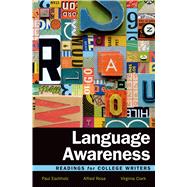Explore the pervasive influence of language on our lives while becoming a better academic writer with Language Awareness.

Note: Supplemental materials are not guaranteed with Rental or Used book purchases.
Purchase Benefits
What is included with this book?
Explore the pervasive influence of language on our lives while becoming a better academic writer with Language Awareness.
1. Reading Critically
Getting the Most out of Your Reading
Natalie Goldberg, Be Specific
Henry Louis Gates Jr., What’s in a Name?
Reading as a Writer
2. Writing in College and Beyond
Developing an Effective Writing Process
Rebekah Sandlin, The "Negro Revolt" in Me (student paper)
3. Writing with Sources
What Does It Mean to Write with Sources?
Write with Sources
Learn to Summarize, Paraphrase, and Quote from Your Sources
Avoid Plagiarism
Jake Jamieson, The English-Only Movement: Can America Proscribe Language with a Clear
Conscience? (student paper)
4. Understanding the Power of Language: How We Find Our Voices
Malcolm X, Coming to an Awareness of Language
Helen Keller, The Day Language Came into My Life
*Sherman Alexie, Superman and Me
*Jang Jin-sung, Reading Byron in Pyongyang
*Emily Parker, You Can Keep Quiet, You Can Emigrate, Or You Can Stay Here and Fight
Martin Luther King Jr., Letter from Birmingham Jail
5. Language Essentials: Making Sense of Words in the World
Susanne K. Langer, Language and Thought
Steven Pinker, Words Don’t Mean What They Mean
*Melissa Fay Greene, Word Power for Babies
Ben Zimmer, Chunking
*Raffaella Zanuttini, Our Language Prejudices Don’t Make No Sense
Lera Boroditsky, Lost in Translation
6. Language Communities: Where Do We Belong?
Paul Roberts, Speech Communities
Richard Lederer, All-American Dialects
*Lou Ann Walker, Losing the Language of Silence
Bharati Mukherjee, Two Ways to Belong in America
James Baldwin, If Black English Isn’t a Language, then Tell Me, What Is?
Amy Tan, Mother Tongue
*Eric C. Miller, Talk the Talk
7. Writers on Writing: How and Why We Write
Stephen King, Reading to Write
*Annie Dillard, Write Till You Drop
*Steven Pinker, Good Writing
Anne Lamott, Shitty First Drafts
William Zinsser, Simplicity
Donald M. Murray, The Maker’s Eye: Revising Your Own Manuscripts
*Bill Hayes, On Not Writing
8. Language that Manipulates: Politics, Propaganda, and Doublespeak
Donna Woolfolk Cross, Propaganda: How Not to Be Bamboozled
Newman P. Birk and Genevieve B. Birk, Selection, Slanting, and Charged Language
George Orwell, Politics and the English Language
*Maria Konnikova, The Lost Art of the Unsent Angry Letter
William Lutz, The World of Doublespeak
Jason Stanley, Language that Silences
9. Language that Changed the World: Words that Made a Difference
Martin Luther King Jr., I Have a Dream
John F. Kennedy, Inaugural Address
*Malala Yousafzai, Address at the Youth Takeover of the United Nations
*Toni Morrison, When Language Dies: 1993 Nobel Prize for Literature Lecture
*Elie Wiesel, The Perils of Indifference
Jonathan Swift, A Modest Proposal
10. The Language of Discrimination: Prejudice, Discrimination, and Stereotypes
Andrew Sullivan, What’s So Bad about Hate?
Gordon Allport, The Language of Prejudice
Firoozeh Dumas, The “F Word”
Brent Staples, Black Men and Public Space
*Wendy Kaminer, Why We Need to Tolerate Hate
*Greg Lukianoff, Twitter, Hate Speech, and the Costs of Keeping Quiet
*Kellie Carter Jackson, The “Threatening” “Thug” through History
*11. The Language of Conflict: Argument, Apology, and Dignity
*Edwin Battistella, Sorry, Regrets, and More
*Donna Hicks, Violations of Dignity
*Michael Gardner, Flex Cop
*Amy Westervelt, Letting Go
*Rick Reilly, Regretlessly Yours: The No-Fault Apology
*Paula Span, Wounded by the Language of War
12. Language and Gender: Power, Abuse, and Equality
*Roxane Gay, The Careless Language of Sexual Violence
*Chimamanda Ngozi Adiche, Happy Feminist
*Emily Bazelon, The Meaning of Yes
Michael Kimmel, Bros Before Hos
*Sharon Marcus, Are Catcalls Free Speech?
*Jessica Bennett, Why We Need to Stop Calling Powerful Women Bitches
13. Current Language Controversies
How Does Technology Impact Communication in Relationships?
Alison Stein Wellner, Lost in Translation
David Carr, Keep Your Thumbs Still When I’m Talking to You
*Sherry Turkle, The Tethered Self: Technology Reinvents Intimacy and Solitude
How Does Language Work in Advertising?
Bill Bryson, The Hard Sell: Advertising in America
William Lutz, Weasel Words: The Art of Saying Nothing at All
*Kiera Butler, The Creepy Language Tricks Taco Bell Uses to Fool People Into Eating There
*Sage McHugh, Watch Out for These Buzzwords Food Companies Use to Hype That Their
Products Are Healthy—They Don’t Mean Anything
How Is Language Involved in Lies, Slander, and Fraud?
*Chana Joffe-Walt and Alix Spiegel, Psychology of Fraud: Why Good People Do Bad Things
*Cienna Madrid, The Lying Disease
*Tom Jacobs, Facts? We Don’t Need No Stinking Facts
*Lyz Lenz, Fact-Checking Grandma
13. A Brief Guide to Writing a Research Paper
The New copy of this book will include any supplemental materials advertised. Please check the title of the book to determine if it should include any access cards, study guides, lab manuals, CDs, etc.
The Used, Rental and eBook copies of this book are not guaranteed to include any supplemental materials. Typically, only the book itself is included. This is true even if the title states it includes any access cards, study guides, lab manuals, CDs, etc.